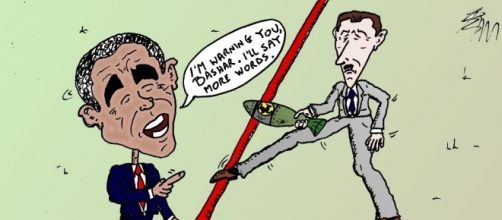On April 10, Wall Street Journal columnist Bret Stephens published a piece called "The Price of Obama's Mendacity," which criticizes the Obama administration for its lack of action against the Syrian government. Obama instead, cut a deal with the Assad regime via the Russians after he had already said that the Assad regime had crossed a "red line" back in 2013, when they used chemical weapons on their own people, killing hundreds with estimates of up to 1,729.
Charlie Rose had Bret Stephens and former deputy national security advisor and deputy Secretary of State under the Obama administration Tony Blinken on his program on the evening of the same day the article was published, to discuss it.
Here, Stephens criticized the former official for not taking action. Prior to this discussion, that weekend, President Trump had just finished attacking a Syrian airbase on April 7. In his piece, Stephens wrote that Obama officials could not run away from taking responsibility, as he put it, “on the consequences of their lies.”
President Obama's 'lies' about Syria's chemical weapons
The sense about Obama's approach to Syria has often been described as wisdom at play as his reason for not taking action. Prior to President Obama, George W. Bush had taken the United States through two wars in Iraq and Afghanistan and the President was not about to have the United States engaged in another war in Syria.
But Bret explained that after the Russians, Syrians and the U.S. had engineered the agreement to get the Assad regime to give up chemical weapons, it was discovered soon after that the Assad regime was cheating. It was pointed out by Blinken during the interview that they knew there were gaps in their declaration of chemical weapons as early as 2014 and then into 2016. During that year, the then Director of National Intelligence James Clapper went to Congress to tell them that Assad had been lying. The way Bret Stephens describes it, Obama's aides, including the President himself, said that they had gotten 100 percent of the weapons out, despite their suspicions.
Tony Blinken responded, saying they were suspicious and that they had even said so.
He said that the administration and the Organization for the Prohibition of Chemical Weapons (OPCW) stated that there were gaps in what was being declared. After Blinken continued to explain that the OPCW had destroyed “declared” weapons, the discussion was redirected to the discrepancy in the language using the word "declared." Blinken also defended their process saying that they had gone repeatedly to the OPCW and the United Nations in order to put more pressure on the Syrian government.
100 percent 'declared' chemical stockpile destroyed
But Stephens pressed Blinken further on their use of this term arguing that not only was it legalese jargon, but that if they had really wanted to pressure on Assad that they should have made a bigger deal out of it.
He said that instead, the Obama administration continued to push the narrative that 100 percent of the chemical weapons, not “declared” chemical weapons, had been removed. Bret also stated that he didn't remember the White House leaning heavily on the issue during the time. He said he especially didn't recall when Secretary of State John Kerry had promoted their suspicions of the Syrian regime. For this reason, Stephens believes that the administration not only lied but he even went as far as to point out why.
He said that at the time, the President was trying to cut a nuclear deal with Iran and that others had drawn similar conclusions that the administration did not want any negative interference over chemical weapons, that would increase the chance of failure for their deal with Iran.
When President Trump was a candidate, he was persistent in his view that the Iran deal was “the worst deal ever made," touting himself as a supreme “deal maker” as evidence that he knows what he's talking about. But the sense that there were no more chemical weapons in Syria has certainly carried over into the Trump administration because, up to the widely reported chemical attack on April 4 (there were already previous reports about other chemical attacks), they were under the impression that they had all been removed.
Diplomacy vs. military action
In the end, when Stephens had exhausted his point about “declared” weapons on Blinken, he said that by not following through with his “red line” statement Obama made the nation look weak.
Tony Blinken defended this by saying that if they hadn't cut a deal, there would have been a "chemical cloud" in the region where nothing would have been turned over and the weapons would have fallen into the hands of terrorists. Even Israel said that the agreement reached was better than having to go to war with the regime.
Bret Stephens' argument about a "weak" America is one that has been used repeatedly against the former administration by Republican lawmakers and Obama's critics. However, as Blasting News pointed out, the air strikes conducted by the U.S. military against the al-Shayrat airbase in Syria after the regime's chemical attack, was intentionally meant to be symbolic rather than one that would cripple Assad's ability to do it again. In the end, the military strikes themselves are seen as enough of a deterrence to rein in the Assad regime.

